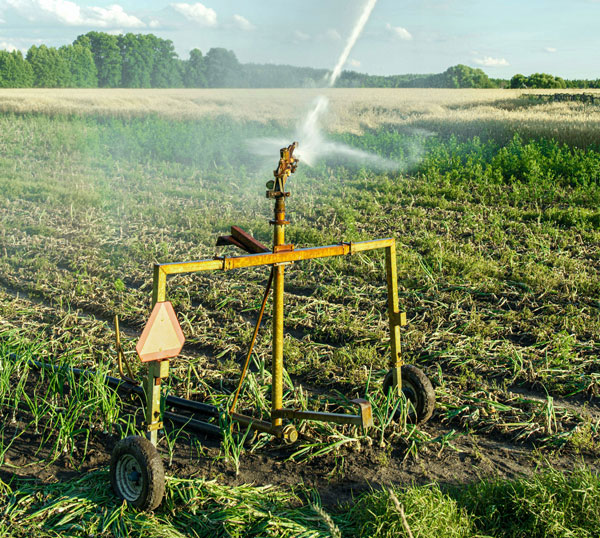
A landmark project in Uganda empowering 108,000 farmers signals of a sea-change in the use of irrigation in Africa.
SPECIAL REPORT | BIRD AGENCY | With irrigation-fed farming the norm in much of north Africa as well as parts of southern Africa, there have long been calls for more irrigation initiatives on the rest of the continent to ensure that Africa’s vast agricultural promise is fulfilled. Those calls are being heard, with both government and private initiatives starting to turn the tide, according to a number of recent studies and reports.
In a landmark project in East Africa, more than 108,000 farmers in Uganda’s Kabuyanda Municipality are set to benefit from a recently launched irrigation project, according to environment-focused news platform, Afrik21.
According to the news platform, the project, launched by Ugandan Minister of State for Water Aisha Sekindi, will result in modern, water-efficient irrigation system installations. A US$200 million dam is set to be built on the Mishumba River, which drains into Kagera River and forms part of the upper headwaters of the Nile.
Kenya’s Galana/Kulalu Food Security Security Project in Kilifi and Tana River counties is another irrigation project underway in the region.
The ambitious project formerly in pilot phase is partially on course as it targets putting close to 400,000 hectares of land to agricultural production.
Already, 10,000 acres are in active irrigation use with government announcements revealing plans to upscale the cultivation size to 20,000 acres in 2024 and upwards of 200,000 acres by 2027.
Besides the government-led investment, the project was opened up for partial privatisation through a public-private partnership structure, a move that is fast closing an investment gap that for years delayed the project’s full takeoff.
B2B food commerce startup, Twiga Foods has commenced maize farming on a 1,606 acre field in the scheme, investing a substantive US$10 million targeting the production of onions, tomatoes and watermelons.
In West Africa, former Nigerian Vice-President Yemi Osinbajo in May inaugurated a close to US$60 million Kano River Irrigation Scheme, a component of the Transforming Irrigation Management in Nigeria Project. Reports show the project has revamped agri-commercial activities for thousands of residents.
According to the federal government website, more than 140,000 farmers are beneficiaries of the 12 irrigation systems linked to the Kano and Shimar rivers. The project is part of Nigeria’s National Irrigation Programme 2016-2030, which seeks to put 3.14 million hectares under irrigation.
The results and positive outcomes of irrigation are already being felt in countries such as those in the north and south African regions that have for years established solid irrigation systems, with agricultural production in a number of countries flourishing. South Africa, Morocco and Egypt provide the lion’s share of citrus exports worldwide, for example.
And the wider irrigation potential in Africa is high, at some 47 million hectares, according to FAO.
The latest State of Food Security and Nutrition in the World report by the UN FAO reveals the extensive need for food security globally and especially in Africa. The FAO highlights that irrigation can boost agricultural productivity by at least 50%. However food production in Africa remains predominantly rain-fed.
Ousmane Badiane, a Rwanda-based researcher and agricultural economist explains the significant role irrigation could play in Africa’s pursuit for food security.
“Elevating irrigation to a top priority could help ensure the continent’s food security in the face of more extreme weather conditions and be an engine of agricultural transformation” he explained
Less than 6% of Africa’s agricultural land is irrigated, according to FAO. Over two-thirds of this land is in Egypt, Algeria, Morocco, South Africa, and Sudan – each boasting over a million hectares.
However, just like in Uganda, local irrigation projects could start turning the tide in effort to convert far more dormant arable land into food production hubs.
Initiatives also include a blend of government-led projects and collaboratively-supported initiatives by the private sector and development institutions such as the World Bank.
‘Water-Wise: Smart Irrigation Strategies for Africa’, a 2018 detailed policy report by The Malabo Montpellier Panel of international agriculture experts estimates that in 13 African countries, tapping into groundwater could offer a potential 120-fold increase, equivalent to 13.5 million hectares, in the total area under irrigation.
These countries include Nigeria, Tanzania, Ghana, Zambia, Burkina Faso, Ethiopia, Niger, Kenya, Mali, Mozambique, Rwanda, Uganda, and Malawi.
However as Badiane explained, expanding irrigation systems will require successful partnerships between farmers, governments and the private sector.
“It will require tax cuts on imported technologies and machines and support for the build-up of an African irrigation technology industry,” he noted.
Other requirements will include training farmers how to install and operate irrigation systems; and transparent and accountable regulation of water use for agriculture, guided by long term cost and benefit considerations, the expert said.
*****
SOURCE:bird story agency
 The Independent Uganda: You get the Truth we Pay the Price
The Independent Uganda: You get the Truth we Pay the Price



So interesting to read
Send me other notes